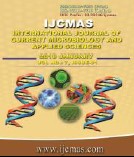


 National Academy of Agricultural Sciences (NAAS)
National Academy of Agricultural Sciences (NAAS)

|
PRINT ISSN : 2319-7692
Online ISSN : 2319-7706 Issues : 12 per year Publisher : Excellent Publishers Email : editorijcmas@gmail.com / submit@ijcmas.com Editor-in-chief: Dr.M.Prakash Index Copernicus ICV 2018: 95.39 NAAS RATING 2020: 5.38 |
Hybrid breeding technology is one of the most feasible options to meet the future food challenges and sustainable agriculture. Large number of cross combinations are attempted and evaluated in hybrid breeding programs, but a few are selected. This is labour intensive, time consuming and costly; despite of it selection efficiency is too low. Therefore, it is important to explore alternate approaches to enhance the selection efficiency to predict hybrid performance. Pedigree data of the parental lines and molecular marker have been effectively employed to predict field performance of hybrids. Marker technologies, wider gene compatibility and QTL approaches on the basis of parental genomic variation are predominantly used for predicting hybrid performance. Informative markers having high PIC would be considered as key markers for heterotic performance prediction. Prediction ability depends on association between QTL and selected molecular markers with major effect on the desired trait, size of population and the recombination frequencies. Transcriptomic and metabolomics data are becoming useful and may provide means for heterosis prediction. Joint analysis of the genomic, transcriptomic and metabolomics data for molecular-based prediction of heterosis needs to be studied for its potential to improve the efficiency of applied hybrid breeding programs. Inter-sub-specific cross combinations depends on genetic remedy to the persisting hybrid semi-sterility problem and entire diversity, and present of neutral wide compatible genes.
 |
 |
 |
 |
 |